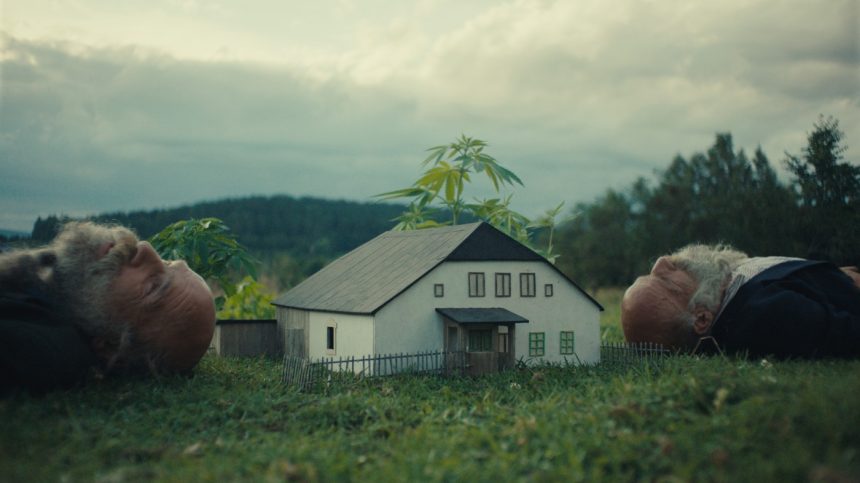‘Better Go Mad in the Wild,’ ‘Bidad,’ ‘Sand City,’ ‘Forensics’ Win Karlovy Vary Festival Awards
Miro Remo’s Better Go Mad in the Wild won the Grand Prix – Crystal Globe, the top award, at the closing ceremony of the 59th edition of the Karlovy Vary International Film Festival (KVIFF) on Saturday, where Stellan Skarsgård was also honored with the KVIFF Crystal Globe Award for his “outstanding artistic contribution to world cinema.” The Special Jury Prize went to Iranian filmmaker Soheil Beiraghi‘s fourth feature, Bidad (Outcry), whose announcement the fest had held back to ensure the safety of its creators.
This year’s jury, consisting of Nicolas Celis, Babak Jalali, Jessica Kiang, Jiří Mádl, and Tuva Novotny, lauded the “delightfully inventive documentary” Better Go Mad as “a funny valentine to the fading art of being true to yourself” and “a portrait of bickering twin brothers who may live a weird, off-grid life on their dilapidated farm, but who, in a world as mad as ours, actually might be the sanest people on Earth.”
Concluded the jury: “In the lifestyle it portrays, but also in the filmmaking risks it takes and the raucously loving brotherhood it admires, Better Go Mad in the Wild feels like a gulp of fresh, woody air, or a quick dip in an outdoor pond, or a moment of contemplation as a cow chews on your beard. In short, it feels like being free.”
Meanwhile, the jury called Bidad, about a Gen Z girl who sings in the streets despite rules that forbid that in Iran, “as courageous in its constantly unexpected narrative turns, as it careens through different genre terrains as energetically as it rolls through the different suburbs of Tehran. It concluded: “Morphing from social-injustice thriller into family melodrama into a triumph-over-adversity arc, it is most striking as a gonzo lovers-on-the-run romance, shot through with punk energy and spiky personality that ends on an ambivalent yet optimistic note — because where there’s this much life, there’s hope.”
You Might Also Like
This year’s best director award went to two films: Lithuanian cinematographer Vytautas Katkus’ feature directorial debut The Visitor, a meditation on solitutde, as well as Nathan Ambrosioni’s Out of Love, a reflection on family and co-existence.
Lauding the “deeply impressive directorial statements,” the jury said that Katkus “truly exploits the creative freedom that a director perhaps only ever properly enjoys with their first film, displaying an uncompromised, idiosyncratic vision that is both dazzlingly precise in its detail and dreamily peculiar as whole.” It also noted that Ambrosioni “demonstrates a maturity, compassion and polish far beyond his years in the moving and beautifully crafted Out of Love in which a rich yet understated presentation that allows the terrific all-ages acting ensemble to deliver intensely felt, empathetic performances.”
In the acting categories, Pia Tjelta was honored with the best actress award for her role in the political relationship drama Don’t Call Me Mama, Àlex Brendemühl won the best actor honor for his role in the rape drama When a River Becomes the Sea, and Kateřina Falbrová received a special jury mention for her role in the sexual abuse drama Broken Voices.
And the Právo Audience Award winner ended up being the fest opening film, We’ve Got to Frame It! (A Conversation With Jiří Bartoška in July 2021), featuring insights and laughs courtesy of the long-term fest president who died recently.
The fourth edition of Karlovy Vary’s Proxima competition, which focuses on bold works by young filmmakers and renowned auteurs alike, revealed Bangladeshi director Mahde Hasan’s Sand City, a movie about harsh life in a metropolis, as its winner, decided by the jury of Yulia Evina Bhara, Noaz Deshe, Nelson Carlos De Los Santos Arias, and Marissa Frobes. “A realm unknown, where architecture breathes and silence screams,” it wrote. “Time drips sideways in this fractured hourglass, and color spills like memory. In Sand City, cinema becomes a trembling map of the strange, abandoned, and intimate at the edge of sense.”
Meanwhile, the Proxima Special Jury Prize was bestowed upon Federico Atehortúa Arteaga’s Forensics, an experimental essay on missing persons. “This award goes to a film that carries forward the tradition of swimming against the current of globalized violence — with truth, with ethics, and above all, with poetry,” the jury said.
And Manoël Dupont’s Before/After, which explores baldness and queer identity, received a special mention in the Proxima lineup.
The non-statutory awards at KVIFF, namely the Europa Cinemas Label honor for the best European film at KVIFF 2025, the Fipresci Award, as well as the Grand Prize of the Ecumenical Jury, put a spotlight on three different movies.
Rebuilding, directed by Max Walker-Silverman and starring Josh O’Connor, won the Ecumenical Jury’s Grand Prize, while the jury gave a commendation to Cinema Jazireh, directed by Gözde Kural. The Europa Cinemas Label honor went to Broken Voices, and the Fipresci honor was awarded to Before/After.
The 2025 edition of the Karlovy Vary fest, which has a reputation as Central Europe’s largest cinema party, had opened with the presentation of KVIFF President’s Awards to Peter Sarsgaard and Vicky Krieps, a film about late long-time KVIFF president Jiří Bartoška, and a concert by U.K. act La Roux.


